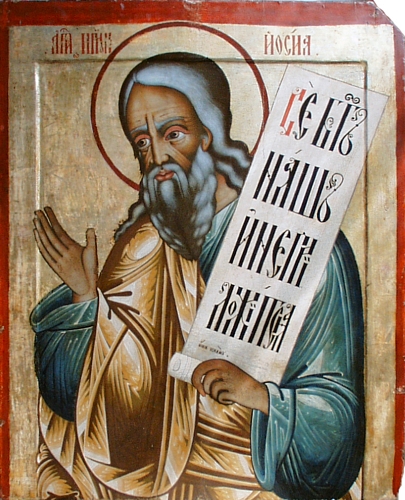|
|||
|---|---|---|---|
| This weekly bulletin insert complements the curriculum published by the Department of Christian Education of the Orthodox Church in America. This and many other Christian Education resources are available at http://dce.oca.org. | |||

The Prophet Hosea is one of the group sometimes called the Minor Prophets because their books are shorter (not less valuable) than those of Major Prophets like Isaiah, Jeremiah and Ezekiel. Hosea, like the slightly earlier prophet Amos, preached to the Northern Kingdom, Israel. But Amos was from the Southern Kingdom, Judah. Hosea was himself from the Northern Kingdom, and so he was preaching to his own people. His whole life, including the difficult spiritual effort God asked of him, was lived out in full sight of those people. In the second verse of Hosea's prophecy we read what that spiritual effort was to be. God commands Hosea to "Go, take to yourself a wife of harlotry and have children of harlotry, for the land commits great harlotry by forsaking the Lord." Hosea's marriage is to reflect the unfaithfulness of Israel toward God. The prophet obediently marries the prostitute Gomer, who then bears three children. Their very names are chilling indications of God's anger at faithless Israel: the Lord tells Hosea that the second child, a daughter, is to be called "Not to Be Pitied." About the third child, a son, God says, "Call his name Not my People, for you are not my people and I am not your God (1: 9). The people of Israel, like Gomer, have ignored or perhaps refused to acknowledge the goodness of their loving husband, who is God Himself. He says, "And she did not know that it was I who gave her the grain, the wine, and the oil, and who lavished upon her silver and gold which they used for Baal" (2: 8). He accuses the people of setting up kings and princes who were not godly, and of worshipping idols. He threatens that they "sow the wind, and they shall reap the whirlwind" (8: 7). But that is not the end of the story. God tells Hosea to buy back his wife from the man who holds her as his lover. Hosea is to tell Gomer she must be faithful, and is to pledge his faithfulness to her. In the same way, though God will discipline the children of Israel, "they shall come in fear to the Lord and to His goodness in the latter days" (3: 5b).
Saint Paul warns the Ephesians against those who are "darkened in their understanding, alienated from the life of God because of the ignorance that is in them, due to their hardness of heart; they have become callous and have given themselves up to licentiousness, greedy to practice every kind of uncleanness" (4: 18-19). He reminds them: "You did not so learn Christ!" If we have "learned Christ" as Paul wants us to, we, like Gomer, will realize that the best thing for us is to "return to my first husband, for it was better with me then than now" (Hosea 2: 7). God awaits that return; it is never His will that we should be so ignorant and hard of heart that we end up reaping the whirlwind. |
|||
